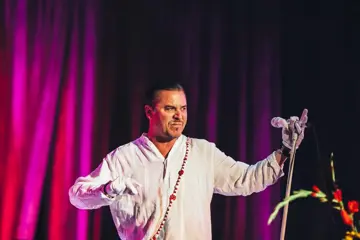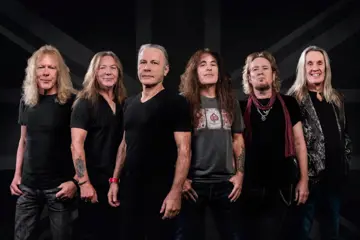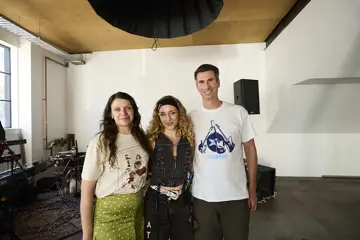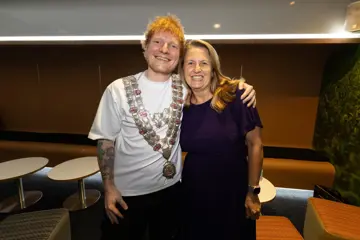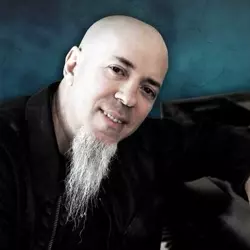 Jordan Rudess
Jordan RudessMany aspiring musicians who later enjoyed fame and fortune have recounted that they had no 'Plan B' if their rock'n'roll dreams hadn't come to fruition; it was succeed or bust. Meanwhile, Jordan Rudess had options - primarily having one aspect of the music world at his feet. At nine, he entered New York's prestigious Juilliard School of Music Pre-College Division for classical piano training.
However, by his late teens, he'd grown increasingly interested in synthesisers and progressive rock music. Inspired by prog-rock heroes like Emerson, Lake & Palmer (he cites hearing their Tarkus album in 1975 as a major turning point), and against the counsel of his parents and tutors, he took the risk of turning away from classical piano and pursued being a solo progressive rock keyboardist. What was the back-up plan if the whole rock music caper hadn't panned out? “I was really turned on by all the rock stuff that I heard when I was a teenager, and was kinda led on a different path. So there was no real fallback in that regard. It was more that I saw what I wanted and I just went down the path, even though maybe it wasn't necessarily from some points of view the smartest thing.
“Certainly my teachers and my parents said, 'You're crazy, what are you doing? You've invested so much time, putting in all your work towards being a classical pianist.' But I was turned on by synthesisers and sounds, and I was young and invincible, so I just went ahead and tried to make it work. It took a while.”
"I was young and invincible, so I just went ahead and tried to make it work."
Doubling-down on his aspirations eventually paid dividends. He's worked with artists spanning from David Bowie and Enrique Iglesias to Liquid Tension Experiment and Steven Wilson. However, the 62-year-old is best known as the virtuoso keyboardist/multi-instrumentalist for Grammy-nominated US progressive metal outfit Dream Theater. The group will issue new opus Distance Over Time in February.
Don't miss a beat with our FREE daily newsletter
Given Dream Theater – who Rudess joined nearly 20 years ago – have been at the forefront of prog for decades, The Music asks the musician/composer what truly “progressive” music means to him, or how he defines it. “Progressive rock for some people is a term that's given to a period of history. Progressive rock meaning, 'Oh, you must be talking about early Genesis, Jethro Tull or Gentle Giant,' and that sound they made in that period of time is like progressive rock. So depending on who you talk to, they could have the meaning of that [music] limited to that particular window of possibilities.
“But really, progressive rock is more than that... The whole idea of progressive rock is to take a style like rock music, and extend it. So all the people that were involved since the beginning that did anything under the name 'progressive rock' have taken harmony and rhythm in rock'n'roll, and brought it beyond the usual boundaries.
“Not only that, but they've done it with sound as well. And that relates to the term 'progressive' because if you're progressive, it means you're kinda moving forward. You're trying new things, you're moving into the future. Look back to the original prog-rock that happened in the very late '60s and '70s, those guys were trying new things. They were experimenting with sound, harmony, rhythm and all the elements. And people are still doing that today... If you think about expanding harmony, rhythm and sound, and that's what progressive is, you can really take it anywhere. I can imagine lots of different stylistic progressive combinations that I haven't heard anybody do yet.”
Rudess also has new solo material on the way, and prior to the next Dream Theater record's release, is due to undertake an Australian solo tour. The Bach To Rock: A Musician's Journey piano performance will traverse through his musical life, touching on material from George Gershwin, David Bowie and John Lennon, through to Pink Floyd, King Crimson and naturally, Dream Theater.
"The piano's a great vehicle for me to tell that story."
“It gives me the opportunity to tell my story,” Rudess explains. “Which basically started when I was seven years old, just touching the piano and starting to find my way and improvise. It's been amazing, it's really good to get in touch with one's self like that. And one thing that's been amazing is that the piano is kinda like a home base for me. It's how it all got started, and I feel really comfortable expressing myself musically on the piano.
“What's cool is that because this is not only a music show, it's also a show in which I'm speaking and talking about the journey, the piano's a great vehicle for me to tell that story. People who come to the shows can really expect to go with me for the ride.”









